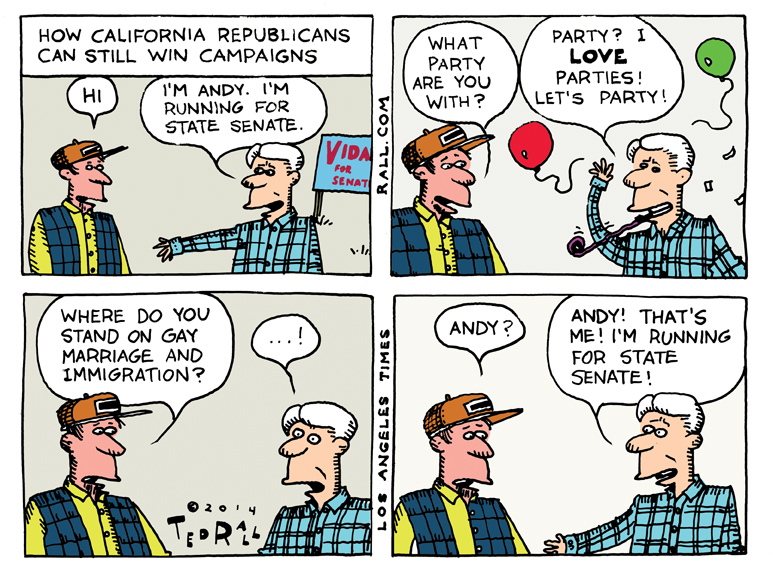Republican Andy Vidak won an upset victory in last year’s special election for a state senate seat representing the San Joaquin Valley, prevailing despite the Democrats’ 22-point advantage in voter registration.
How’d he do it? His explanation: “Our message was that common sense has no party lines.” But as The Times’ Patrick McGreevy writes, his common sense might also have a lot to do with knowing when to shut up. “He sidestepped gay marriage and some other divisive issues — while taking a moderate approach to immigration,” writes McGreevy.
California’s state GOP is in dire straits, not having elected a Republican to statewide office since 2006. So it’s not a big surprise that they’re looking to Vidak’s strategy, which also worked for Anthony Cannella of Ceres, as a way back to relevance. Both men were the only Republicans to vote with Democrats to issue drivers’ licenses to illegal immigrants.
Both the California and national GOP party platforms oppose gay marriage and concessions to undocumented residents.
Sacramento’s interest in Vidak is the manifestation of an ongoing national debate. Prominent Republicans such as probable 2016 presidential candidate Rand Paul are urging their party to change their positions on these issues, saying that demographic changes require new thinking. “Republicans need to become parents of a new future with Latino voters or we will need to resign ourselves to being a permanent minority status,” Paul said last year.
A February piece in the right-leaning Examiner lays out “Five things Republicans should just stop talking about already.” Number 3 is social issues. “Republicans should deemphasize social issues. Voters are split on issues like gay marriage and abortion, but they are much more united on the twin issues of the economy and Obamacare.” Number 4 is immigration. “In contrast to the economy, immigration is an issue where many Republicans are at odds with a strong majority of voters.”
The old question is, should a party stick to its long-standing convictions, even if it means losing elections? Or should it accommodate its positions to reflect the changing opinions of voters?
What’s new here is the suggested tactical compromise: maintain your platform as is, do whatever you can to promote your ideals — in this case, opposition to gay marriage and illegal immigration — after you win enough elections to be in a position to do so. But don’t talk about those issues to voters. Because if they knew what you were all about, they’d vote against you.
Count on people’s ignorance. Bait and switch. Your future relies on lies of omission.
Vidak’s la-la-la-I-can’t-hear-you act on social issues may have won him a state senate seat. But it’s a hardly a promising way to restore people’s faith in their elected officials.


1 Comment.
Andy screwed up, the properly political answer is “I have very strong convictions on that issue”.
We *do* have a representative government. (“do” in this case meaning “that’s the way it’s supposed to work”)
So, is a representative’s job to vote his own conscience (assuming he has one) or is it to vote the way his constituency wants him to vote? I say the former, because we don’t know what issues will come up during his term. We can only elect someone who we think will think like we do when faced with new issues.
The fly in the ointment is that the GOPranos keep wanting to revisit old issues. In that case, the GOP electorate would be well advised to vote for a tape recorder instead of a fallible human being who might have a sudden attack of conscience at an inconvenient time.